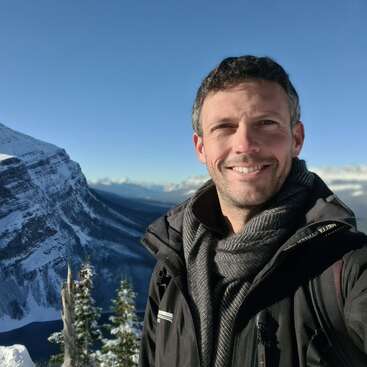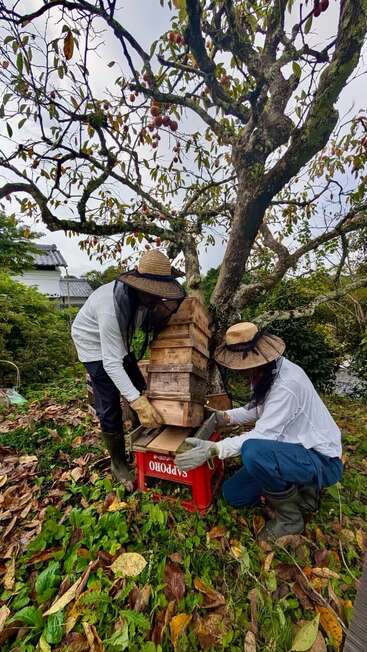Profilangaben

Host Bewertung
100 %

Letzte Antwort
1 März 2026

Beantwortungsquote
98.7 %
Antwortet in der Regel innerh. 6 Tage

Feedback
22

Verifizierte E-Mail
Abzeichen (3)




Finde deinen perfekten Gastgeber
Geforderte Mindest-Aufenthaltsdauer: mindestens 1 Woche
Informationen

Beschreibung
DEAR WORKAWAY GUEST: PLEASE READ OUR ENTIRE PROFILE CAREFULLY BEFORE SUBMITTING A REQUEST.
AVAILABLE WORKING PERIODS IN 2026:
January 17 - 24; February 14- 21; March 14 - 21; April 18 - 25; May 16 - 23; June 20 - 27;
September 19 - 26; October 17 - 24; November 14 - 21.
NOTE: We do not accept requests outside of these dates and we advice you not to send requests earlier than two months before an available or desired period. Instead of following the principle 'first come, first served', we rather look at who fits best with our project and with whom he/she can form the best duo.
OUR PROFILE:
After living in the Netherlands for 30 years, we (Hiroë and Jos) moved to the Japanese countryside, ± 10 km east of Nara town. We live in a renovated traditional house in a quiet, green area. Both 70+, we are young at heart and like to share our experiences with younger generations.
The aging population and rural exodus motivate us to develop activities that make it attractive for young people to stay there or to return.
At the same time, we are concerned about the natural environment, the neglect of rice fields, forests, old hiking trails.
With 'sustainability' at the core of our activities, we try to involve as many (young) people as possible in everything we do. We place a high value on cooperation and the promotion of a 'common' mentality.
Finally, we strive for 'self-sufficiency' in the field of energy, food, water and wastewater treatment. All together a long-term project as a stimulating example for anyone who cares about the future of the earth.
Our - rather young - project includes:
*creation of a park-like food forest
*solar energy generation
*construction of a natural wastewater treatment plant in cooperation with Yamanashi University
*keeping of wild bees
*restoring and maintaining a bamboo grove
*managing 'Arayashiki', a renovated traditional house for events and overnight stays
*general maintenance of the site and care of the vegetation.
We work together with an enthusiastic, but changing group of local volunteers, who use to come every 3rd Sunday of a month. That always coincides with the stay of Workaway guests.
We also work closely with teams from two different universities:
one for a multi-year research of the soil conditions in the food forest and
one for the analysis of ground and well water and their usability. In collaboration with the latter team we’re making a 'Constructed wetland' for natural wastewater treatment, intended as a demonstration project for decentralized/independent natural wastewater treatment.
Finally, our house serves as a base for the 'mirokunomichi' initiative that restores old footpaths and maps their cultural-historical significance.
Our project is a private and non-commercial initiative.
Arten von Hilfe und Lernmöglichkeiten
Hilfe bei Ökoprojekten
Gartenarbeiten
Mithilfe auf einem Bauernhof
Hausarbeiten

Interessengebiete
KulturNachhaltigkeitFarmarbeitBücherGartenarbeitenNatur
UNO-Ziele für nachhaltige Entwicklung, die dieser Gastgeber verfolgt

Kultureller Austausch und Lernmöglichkeiten
CULTURAL EXCHANGE:
We are located in the province of Nara, rich in cultural history and nature with numerous famous Buddhist temples and Shinto shrines, hiking trails and picturesque towns. Kyoto and Osaka are nearby big cities and easily accessible.
Of course we let our guests taste as much as possible of the Japanese culture in both a literal sense through our kitchen, and through tips and information about activities and sights in our area.
Finally: our house has an informal, open atmosphere where guests, visitors, volunteers and students sometimes unplanned gather around the kitchen table in order to exchange ideas, stories, creative talent and the like. Workaway guests are of course very welcome to join such spontaneous events.
Arbeit
TASKS
The commitment of the Workaway guest is requested for:
common activities in the gardens, food forest and bamboo grove such as sowing/planting, mulching, weeding/mowing, watering, harvesting, pruning, sawing wood or cutting bamboo, making charcoal, cleaning up
We assume 3 - 5 helping hours per day for 5 days a week (excl.. breaks, meals and household chores)
In our way of 'farming', we follow aspects of permaculture, agroforestery, natural farming, etc., but put these principles into practice according to our own insights. We are always open to suggestions that contribute to healthy food production and a sustainable lifestyle.
QUALIFICATIONS:
The minimum age of Workaway guests we accept is 23!
The Workaway guest is not required to have any specific expertise in the field of ecological farming, even though that is welcome. However, we explicitly choose Workawayers who want to work on the field with heart and soul and have experience with it. Only enthusiasm for outdoor activities, nature and/or food doesn’t appeal to us. People who are afraid of insects, snakes or other animals had better not apply.
We also expect our guests to be socially minded and have an above-average environmental and climate awareness.
Reliability, strong motivation, flexibility and communication skills are definitely requirements.
As part of the selection proces we will have an introductory meeting with potential guests via video calling.
Furthermore, the guest should take into account sometimes heavy physical tasks, where you don't keep clean hands. So bring work clothes and protection against bright sun.
Boots, gloves, helmet and face protection are available. Most of the tasks are manual, but sometimes we use light machines. We instruct you how to use them safely.
Usually you help together with the host and sometimes with local volunteers. But we expect you to also do jobs alone and independently.
Gesprochene Sprachen
Japanisch: Fließend
Niederländisch: Fließend
Englisch: Gute Kenntnisse
Unterkunft
ACCOMMODATION :
Ryokan style house with tatami rooms for two or more people with shower, toilet and kitchen. All areas and activities are non-smoking. The hot water boiler is wood-fired (task for the guests). The kitchen is equipped with air conditioning/heating. Other areas have no heating.
There is NO WIFI in this house!
We offer and share one meal a day, mostly dinner(Japanese/fusion cuisine, non-vegetarian). We do not accommodate exceptional dietary requirements such as gluten free.
Breakfasts and lunches are prepared by the guests themselves. We provide desired ingredients for this.
PLEASE NOTE: There are no shops, restaurants or ‘combini’ in or near our village. For groceries you can always join us when driving to supermarkets in Nara or Kizugawa.
WE EXPECT THE GUESTS TO KEEP THE ACCOMMODATION WELL ORGANIZED AND CLEAN.
Was noch ...
PUBLIC TRANSPORT
We live in a village ± 10 km from Nara town. There is a limited bus service from JR station and Kintetsu station (bus 105, 106 and 94). It takes ± 40 min. Fare Yen 710; from the bus stop (at the post office in our village) it’s 7 minutes walking to our house.
Etwas mehr Information

Internet Zugang

Eingeschränkter Internet Zugang

Wir besitzen Tiere

Wir sind Raucher

Familien möglich

Platz zum Abstellen von Camper Vans
Dieser Gastgeber bietet Platz für Wohnmobile.

Kapazität - wie viele Workawayer maximal
zwei

Meine Tiere/Haustiere
Chatte mit Workawayern, die diesen Gastgeber besucht haben






Feedback (10)
Truly special people;… read more
Chatte mit Workawayern, die diesen Gastgeber besucht haben






Feedback
Dies sind zusätzliche optionale Bewertungen, wenn Mitglieder Feedback hinterlassen. Es wird die im Schnitt hinterlassene Bewertung für jede Option angezeigt.
Korrekte Angaben im Profil:
(5.0)
Kultureller Austausch:
(5.0)
Kommunikation:
(5.0)
Truly special people;… read more
I really enjoyed working on the farm and learning about the food forest. The working hours felt very fair, and we adapted them flexibly to the weather.
On the day we arrived, they kindly took us to a supermarket and made sure… read more
Hiroe and Jos are lovely hosts, caring and generous. They speak perfect English, which meant less of a language barrier, but they also took time to help me improve my basic Japanese.
We had great… read more
Their… read more
Working hours are very reasonable, especially since we had to deal with hot weather.
Hireo and Jos are very… read more
As a workawayer, I… read more
If you ever come to Japan, you must visit and contribute to Jos & Hiroe beautiful and meaningful project.
It was our second workaway, despite that, I don't think we will ever live another experience that amazing. We had the best time in Sugawacho, we have been treated with a lot of kindness, our accommodation was better than… read more




































